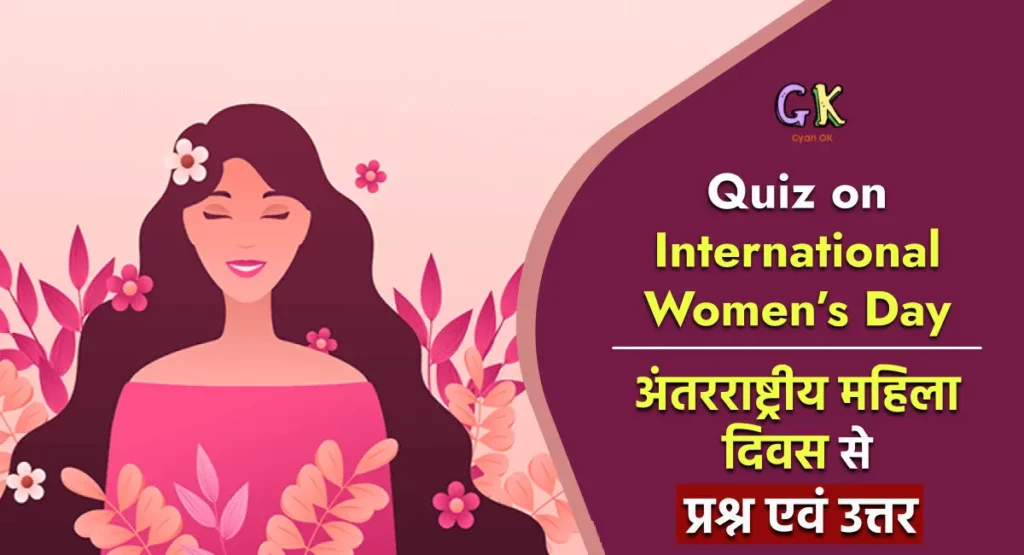International Women’s Day, observed each year on March 8th, is a global event promoting gender equality and women’s rights. It is celebrated worldwide through various activities to raise awareness about issues related to women and inspire positive change. We have prepared this article to spread general awareness on the topic in a quiz format.

General Knowledge Quiz on Women’s Day
International Women’s Day highlights the ongoing struggle for gender equality and women’s rights. It provides a global platform to address issues like gender discrimination, violence against women, and unequal opportunities. This observance reminds us of the achievements of women in various fields and inspires further progress. It encourages important conversations about gender bias and the need for women’s empowerment. Women’s Day fosters solidarity and unity among women worldwide, promoting a more inclusive and equitable society. Ultimately, it serves as a powerful reminder that the fight for women’s rights is not over and that everyone must actively contribute to gender equality.
To contribute to spreading knowledge and commemorate this important day, we have prepared a General Knowledge quiz on Women’s Day. This quiz allows people to test their understanding of the historical significance and achievements of women worldwide.
[–MCQ-QUESTIONS-DISPLAY–]
History of International Women’s Day
International Women’s Day has its origins in the labour and women’s rights movements of the early 20th century. The history of this global observance is marked by several key events:
1908: The idea for International Women’s Day was inspired by a strike of female garment workers in New York City. On March 8th of that year, thousands of women marched through the city to demand better working conditions, shorter working hours, and the right to vote.
1909-1913: International Women’s Day gatherings and rallies began to take place in various countries across Europe. Women in different nations used this day to advocate for their rights, including the right to vote.
1910: An International Women’s Conference was held in Copenhagen, Denmark. Clara Zetkin, a prominent German socialist, proposed the idea of an annual International Women’s Day to promote equal rights, including suffrage, for women worldwide. The conference attendees, representing various countries, agreed to her proposal.
1917: March 8th, 1917, marked a pivotal moment in the history of International Women’s Day. Women in Petrograd (now St. Petersburg), Russia, took to the streets to protest food shortages, poor working conditions, and the First World War. Their demonstrations, known as the “Bread and Peace” strike, played a significant role in the Russian Revolution, which led to the abdication of the tsar and eventually women in Russia gaining the right to vote.
1921: The Second International Conference of Working Women held in Moscow established March 8th as the official date for International Women’s Day.
1977: The United Nations officially recognized March 8th as International Women’s Day, and it has since become a global observance celebrated by people of all genders around the world.
Today, International Women’s Day is not only a day to celebrate the achievements and contributions of women but also a day for activism and advocacy. It serves as a platform to raise awareness about gender equality, women’s rights, and the ongoing challenges and barriers that women face in various aspects of life. The day symbolizes the ongoing struggle for gender equity and serves as a call to action for a more inclusive and just world.
Significance of Celebrating International Women’s Day
Promoting Gender Equality: International Women’s Day is a global platform that underscores the urgent need to address gender disparities, bridging the gap between men and women in terms of rights, opportunities, and representation.
- Empowering Women: This day serves as a source of empowerment for women, instilling confidence and encouraging them to break barriers, defy stereotypes, and achieve their fullest potential.
- Inspiring Change: It inspires individuals and communities to take action, advocating for policies and practices that protect and advance women’s rights, fostering a more equitable society.
- Recognizing Achievements: Celebrating International Women’s Day is about honoring the remarkable contributions of women throughout history, in fields ranging from science and politics to arts and culture.
- Fostering Unity: The day fosters unity and solidarity among women and their allies worldwide, emphasizing that the struggle for gender equality is a shared endeavour.
- Raising Awareness: It raises awareness about pressing issues like violence against women, reproductive rights, and unequal pay, fueling important conversations and advocacy efforts.
- Advocating for Inclusivity: International Women’s Day advocates for inclusivity, encouraging diverse representation and equal opportunities for women from all backgrounds.
- Policy Advocacy: It calls on governments and policymakers to review and strengthen policies that safeguard women’s rights and promote gender equality.
- Global Impact: This observance transcends borders, creating a global movement that strives for a world where women’s rights are upheld, and gender disparities are eliminated.
Celebrating Progress: It celebrates the progress made in the fight for gender equality while recognizing that there is still work to be done to create a more just and equitable society for all.
